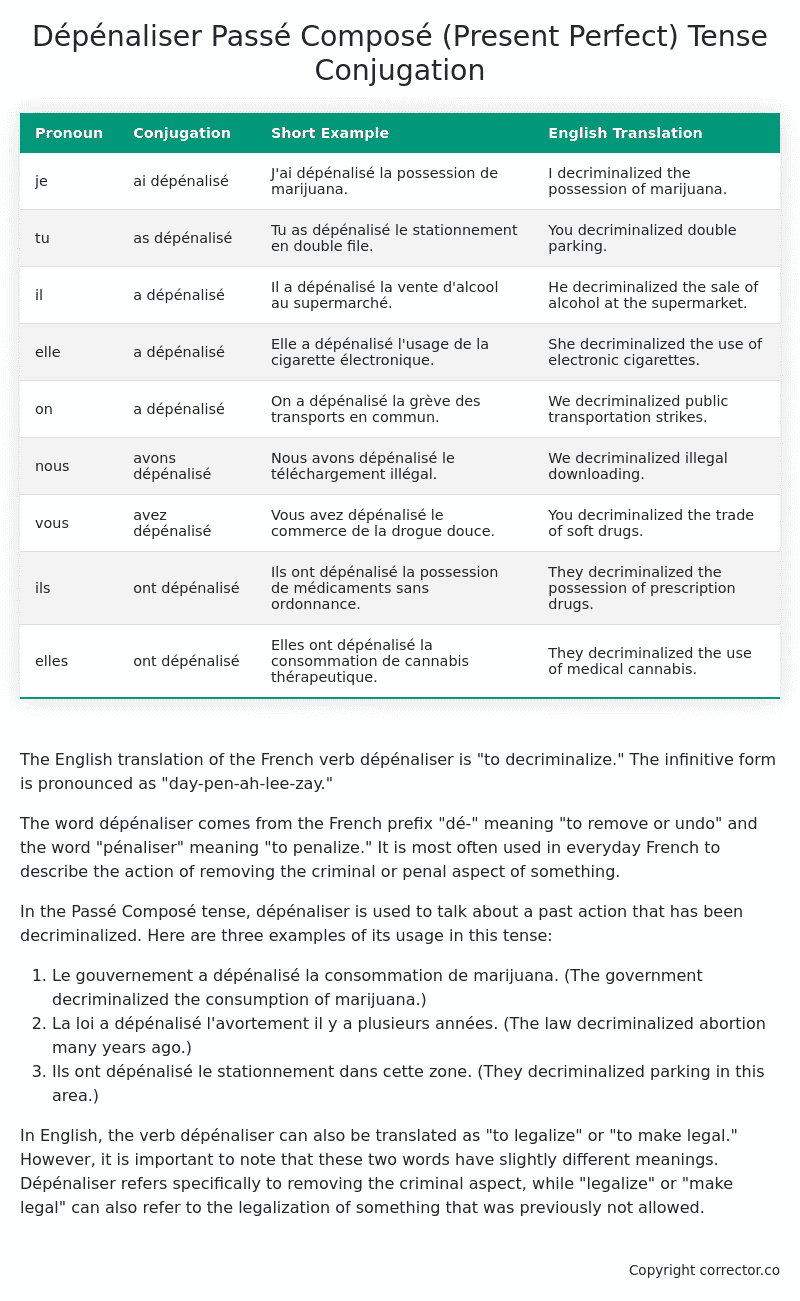Passé Composé (Present Perfect) Tense Conjugation of the French Verb dépénaliser
Introduction to the verb dépénaliser
The English translation of the French verb dépénaliser is “to decriminalize.” The infinitive form is pronounced as “day-pen-ah-lee-zay.”
The word dépénaliser comes from the French prefix “dé-” meaning “to remove or undo” and the word “pénaliser” meaning “to penalize.” It is most often used in everyday French to describe the action of removing the criminal or penal aspect of something.
In the Passé Composé tense, dépénaliser is used to talk about a past action that has been decriminalized. Here are three examples of its usage in this tense:
- Le gouvernement a dépénalisé la consommation de marijuana. (The government decriminalized the consumption of marijuana.)
- La loi a dépénalisé l’avortement il y a plusieurs années. (The law decriminalized abortion many years ago.)
- Ils ont dépénalisé le stationnement dans cette zone. (They decriminalized parking in this area.)
In English, the verb dépénaliser can also be translated as “to legalize” or “to make legal.” However, it is important to note that these two words have slightly different meanings. Dépénaliser refers specifically to removing the criminal aspect, while “legalize” or “make legal” can also refer to the legalization of something that was previously not allowed.
Table of the Passé Composé (Present Perfect) Tense Conjugation of dépénaliser
| Pronoun | Conjugation | Short Example | English Translation |
|---|---|---|---|
| je | ai dépénalisé | J’ai dépénalisé la possession de marijuana. | I decriminalized the possession of marijuana. |
| tu | as dépénalisé | Tu as dépénalisé le stationnement en double file. | You decriminalized double parking. |
| il | a dépénalisé | Il a dépénalisé la vente d’alcool au supermarché. | He decriminalized the sale of alcohol at the supermarket. |
| elle | a dépénalisé | Elle a dépénalisé l’usage de la cigarette électronique. | She decriminalized the use of electronic cigarettes. |
| on | a dépénalisé | On a dépénalisé la grève des transports en commun. | We decriminalized public transportation strikes. |
| nous | avons dépénalisé | Nous avons dépénalisé le téléchargement illégal. | We decriminalized illegal downloading. |
| vous | avez dépénalisé | Vous avez dépénalisé le commerce de la drogue douce. | You decriminalized the trade of soft drugs. |
| ils | ont dépénalisé | Ils ont dépénalisé la possession de médicaments sans ordonnance. | They decriminalized the possession of prescription drugs. |
| elles | ont dépénalisé | Elles ont dépénalisé la consommation de cannabis thérapeutique. | They decriminalized the use of medical cannabis. |
Other Conjugations for Dépénaliser.
Le Present (Present Tense) Conjugation of the French Verb dépénaliser
Imparfait (Imperfect) Tense Conjugation of the French Verb dépénaliser
Passé Simple (Simple Past) Tense Conjugation of the French Verb dépénaliser
Passé Composé (Present Perfect) Tense Conjugation of the French Verb dépénaliser (this article)
Futur Simple (Simple Future) Tense Conjugation of the French Verb dépénaliser
Futur Proche (Near Future) Tense Conjugation of the French Verb dépénaliser
Plus-que-parfait (Pluperfect) Tense Conjugation of the French Verb dépénaliser
Passé Antérieur (Past Anterior) Tense Conjugation of the French Verb dépénaliser
Futur Antérieur (Future Anterior) Tense Conjugation of the French Verb dépénaliser
Subjonctif Présent (Subjunctive Present) Tense Conjugation of the French Verb dépénaliser
Subjonctif Passé (Subjunctive Past) Tense Conjugation of the French Verb dépénaliser
Subjonctif Imparfait (Subjunctive Imperfect) Tense Conjugation of the French Verb dépénaliser
Conditionnel Présent (Conditional Present) Tense Conjugation of the French Verb dépénaliser
Conditionnel Passé (Conditional Past) Tense Conjugation of the French Verb dépénaliser
L’impératif Présent (Imperative Present) Tense Conjugation of the French Verb dépénaliser
L’infinitif Présent (Infinitive Present) Tense Conjugation of the French Verb dépénaliser
Struggling with French verbs or the language in general? Why not use our free French Grammar Checker – no registration required!
Get a FREE Download Study Sheet of this Conjugation 🔥
Simply right click the image below, click “save image” and get your free reference for the dépénaliser present perfect tense conjugation!

Dépénaliser – About the French Passé Composé (Present Perfect) Tense
Formation of the Passé Composé
Set the auxiliary verb with either
Conjugate the auxiliary verb
Add the past participle
Common everyday usage patterns
Narrating Past Events
Sequential Actions
Describing Completed Actions
Interactions with other tenses
Imperfect Tense
Conditional and Future Tenses
Summary
I hope you enjoyed this article on the verb dépénaliser. Still in a learning mood? Check out another TOTALLY random French verb conjugation!


